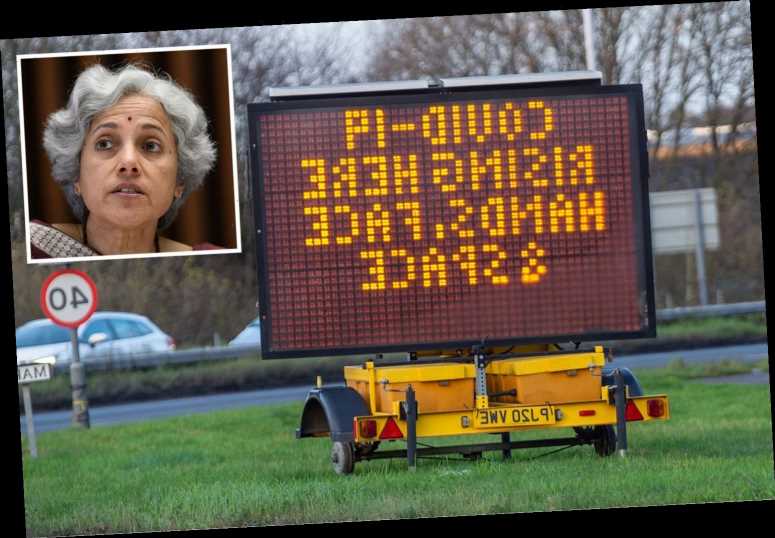COVID-19 herd immunity won't be reached in 2021 – even with vaccines being rolled out, the World Health Organization (WHO) has warned.
It means measures like social distancing, excessive hand washing and face masks aren't going away any time soon.
Herd immunity is when a large number of people are protected against a disease, usually through vaccination but also through natural infection.
If enough people are vaccinated, creating "herd immunity", it's harder for the disease to spread to those people who cannot have vaccines, slowly pushing the virus out of circulation.
Generally experts estimate that 75 per cent of the population need to be jabbed to achieve herd immunity.
But for measles, for example, at least 95 per cent of people need the vaccine.
Dr Soumya Swaminathan, the WHO's body's chief scientist, urged people to continue strict social distancing measures for the rest of the year while immunity builds up, Fox News reported.
Speaking at a press conference on Monday, Dr Swaminathan said: "Even as vaccines start protecting the most vulnerable, we’re not going to achieve any levels of population immunity or herd immunity in 2021.
"Even if it happens in a couple of pockets, in a few countries, it’s not going to protect people across the world.
"The vaccines are going to come. They are going to go to all countries.
"But meanwhile we mustn't forget that there are [public health] measures that work."
Three vaccines have been approved for use in the UK – Pfizer, AstraZeneca and Moderna – and a handful of others are in use across the world.
But even in the UK, where more people have been jabbed than anywhere else in Europe, it will take several months for everyone to be vaccinated.
The Health Secretary Matt Hancock has pledged all adults will have been offered the jab by autumn of 2021.
But even if that ambitious target is met, billions of other people in the world will not be vaccinated, particularly in poorer countries.
Dr Bruce Aylward, an adviser to WHO’s director-general, called on the global community to ensure all countries have access to vaccines.
He added that the UN health agency was hoping coronavirus vaccinations could start either this or next month in some of the world’s poorer countries.
"We cannot do that on our own," Dr Aylward said.
Professor Jonathan Van-Tam, the deputy chief medical officer for England, said the coronavirus was unlikely to be eradicated, even with vaccines.
And people may need booster jabs to keep their immunity up, or a completely new vaccine every year depending on the strains of coronavirus that are around at the time.
Because the vaccines are new, it is not clear how long they will work for.
But Prof Tam told LBC Radio this morning it was his “hunch” was they would remain effective for months.
Giving his best estimate on how long the current vaccine would be effective against mutations, Prof Van-Tam said “how long is a piece of string".
But “I would say it’s going to be many months that the vaccine is going to work for, but I’m not basing that on data, I’m basing it on a hunch”.
Now there are new coronavirus variants to contend with, which have the potential risk of evading vaccines.
Asked whether, in time, an annual jab would be required against a different strain, as happens with flu, Prof Van-Tam said: “I can’t say it will be every year yet but I can say that I don’t think we will ever eradicate coronavirus.”
When vaccines first started being dolled out in December, Prof Van-Tam was cautiously optimistic.
He and other experts have warned those who have received their vaccine must keep following "hands, face, space" guidance.
No vaccine is 100 per cent effective at protecting someone, so there is still a risk they can catch Covid while it is spreading.
The jabs have been proven to protect people from getting severe disease or dying from Covid.
However, there is the possibility that people who have been vaccinated can still catch the virus and pass it onto other people.
Prof Van-Tam said that people should not think that “after the second dose of your vaccine it’s OK to behave with wild abandon and go off to the bingo halls and whatever you like”.
He said: “I can assure [the vaccinated] that it’s very likely you’ll be protected from severe illness, but I can’t give you the assurance that you won’t still pose a hazard to others through transmitting the virus.
"We have to just be patient on this point, and give it another two or three months.”
But the Prime Minister Boris Johnson is confident we will "be back to life as pretty much as close to normal" by the spring.
He told Brits before the New Year that 2021 would be "when we will eventually do those everyday things that now seem lost in the past" – including going to the pub or holding hands with a loved one.
The Health Secretary Matt Hancock also believes 2021 will bring a "summer we can enjoy".
Source: Read Full Article



